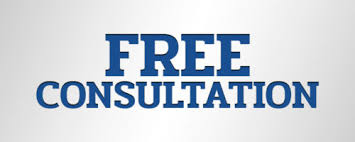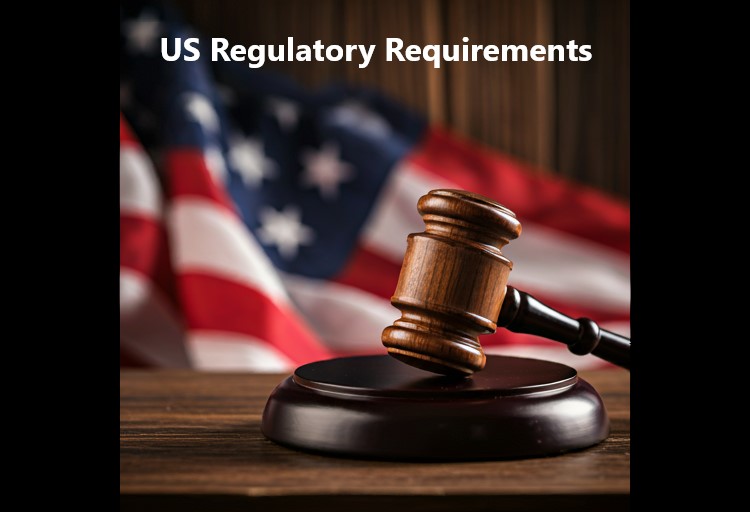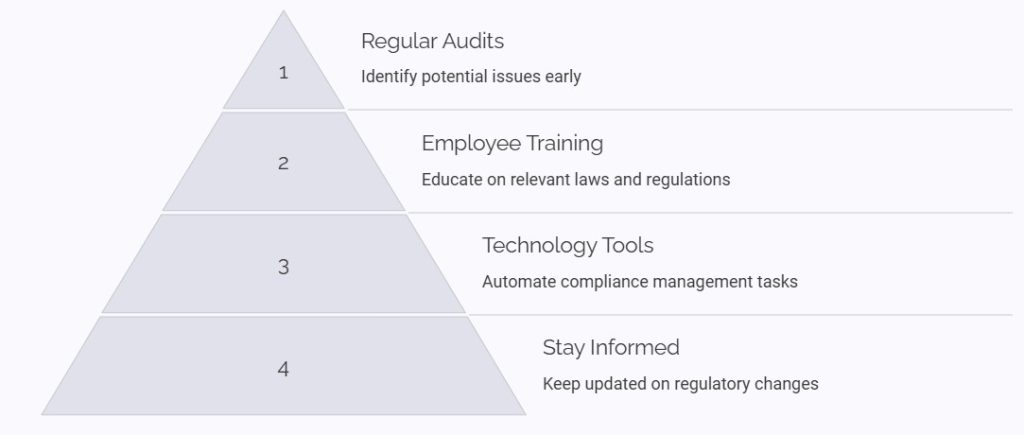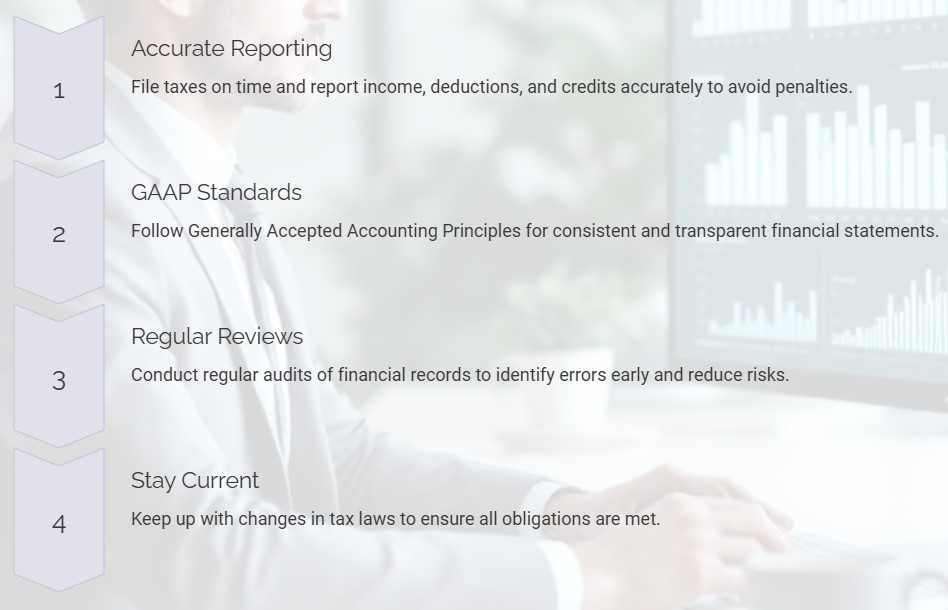
Staying compliant requires proactive planning as well as regular updates to your processes. Regulations often change, and keeping up ensures you meet all legal obligations. From tax compliance to workplace safety, each requirement plays a role in ensuring smooth operations.
By prioritizing compliance, you reduce risks and also demonstrate accountability. US regulatory requirements may seem complex, but with the right approach, you can handle them effectively. This focus not only protects your business but also fosters trust with your customers and partners.
Understanding Federal Regulatory Frameworks
Understanding federal regulatory frameworks is key to staying compliant and avoiding penalties. Agencies like the SEC, FDA, OSHA, and EPA oversee various aspects of business operations. These agencies set as well as enforce standards to protect public health, safety, and the environment.
The SEC regulates financial markets and ensures transparency in corporate reporting. Businesses must comply with its requirements to maintain investor confidence. The FDA oversees the safety and effectiveness of food, drugs, and medical devices. Compliance with FDA regulations protects public health and builds trust in your products.
OSHA focuses on workplace safety by setting standards to prevent injuries and also promote healthy environments. Meanwhile, the EPA enforces environmental laws, helping businesses minimize their ecological impact. Adhering to EPA regulations ensures sustainable operations and avoids environmental damage.
By understanding these agencies as well as their roles, you can better navigate US regulatory requirements. Staying informed and compliant not only protects your business but also strengthens its reputation. Proactively addressing regulations demonstrates your commitment to ethical and lawful practices.
Best Practices for Maintaining Regulatory Compliance
Maintaining regulatory compliance requires consistent effort and a proactive approach. Conducting regular audits is one of the most effective ways to identify potential issues. Audits help you catch errors early, reducing the risk of fines or penalties. Reviewing processes and records ensures your business aligns with US regulatory requirements.
Employee training is another essential practice for staying compliant. Providing education on relevant laws and regulations helps your team understand their responsibilities. When employees know how to follow guidelines, they can avoid mistakes that might lead to non-compliance. Ongoing training keeps everyone updated on new rules and best practices.
Using technology for compliance management simplifies tracking and monitoring obligations. Software tools can automate tasks like document storage, reporting, as well as deadline reminders. These systems help you maintain accurate records and reduce human error. Technology also allows you to adapt quickly to changing regulations.
By prioritizing these best practices, you create a strong foundation for compliance. Regular audits, employee training, and technology tools ensure your business stays aligned with legal requirements. Meeting US regulatory requirements builds trust, protects your reputation, and also supports long-term growth.
Industry-Specific Regulatory Requirements
Industry-specific regulatory requirements play a significant role in shaping business practices. Each industry faces unique regulations designed to address its specific risks and needs. For businesses in healthcare, laws like HIPAA govern the handling of sensitive patient data. Adhering to these regulations helps protect patient privacy and maintain trust.
The finance industry is heavily regulated by laws such as the Sarbanes-Oxley Act and the Dodd-Frank Act. These regulations ensure transparency in financial reporting and prevent fraud. Compliance with these rules strengthens investor confidence and protects market stability. Manufacturing companies must follow OSHA standards to maintain workplace safety and EPA guidelines to minimize environmental impact. These regulations promote safe operations and sustainability.
Technology companies face evolving regulations that address data privacy and cybersecurity. Laws like the CCPA as well as GDPR require businesses to protect customer data and manage consent. Following these regulations not only avoids penalties but also builds consumer trust. Navigating US regulatory requirements across industries requires staying informed and proactive.
By understanding the regulations unique to your industry, you can better align your operations with legal expectations. Compliance reduces risks and also enhances the credibility of your business. Adopting a tailored approach ensures you meet industry standards while maintaining operational efficiency.
Tax and Financial Reporting Compliance
Tax and financial reporting compliance is a fundamental aspect of running a business in the United States. Federal and state tax regulations require accurate reporting of income, deductions, and credits. Businesses must file taxes on time to avoid penalties, interest, and also potential audits.
Reporting standards, such as Generally Accepted Accounting Principles (GAAP), guide how you prepare financial statements. Adhering to these standards ensures consistency and transparency in your financial records. Accurate reporting builds trust with investors and also meets US regulatory requirements for public and private companies.
Failure to comply with tax laws can lead to severe consequences. Penalties for non-compliance include fines, audits, as well as possible legal action. Regular reviews and audits of your financial records help identify errors early and reduce risks. Staying current on changes in tax laws also ensures you meet all obligations.
By maintaining compliance, you protect your business from financial and reputational harm. Strong financial practices demonstrate responsibility and support long-term success. Meeting these US regulatory requirements fosters confidence among employees and keeps your business on track.
Employment and Labor Laws
Employment and labor laws are an essential part of US regulatory requirements. Wage laws, such as the Fair Labor Standards Act (FLSA), set minimum pay standards and regulate overtime. These laws ensure that employees receive fair compensation for their work. Adhering to these regulations prevents disputes and promotes a positive workplace environment.
Anti-discrimination laws protect workers from unfair treatment based on race, gender, age, or other protected characteristics. Title VII of the Civil Rights Act and the Americans with Disabilities Act (ADA) are key regulations addressing workplace equality. Compliance with these laws fosters inclusivity and safeguards your business against potential legal challenges.
Workplace safety is another critical area governed by regulations. OSHA establishes safety standards to protect employees from hazards on the job. Regular inspections and training help businesses meet these requirements. Prioritizing safety reduces risks and demonstrates your commitment to employee well-being.
By following employment and labor laws, you create a fair and secure workplace. Staying informed about these US regulatory requirements helps you build trust with employees and avoid costly penalties. A compliant and supportive environment strengthens your business and supports its growth.
Data Privacy and Security Regulations
Data privacy and security regulations play a critical role in how businesses handle customer information. Laws like GDPR, CCPA, and HIPAA set clear guidelines for protecting data. These regulations affect how you collect, store, and share personal information, emphasizing transparency and consent.
The General Data Protection Regulation (GDPR) applies to companies that process data from EU residents. It requires businesses to obtain clear consent before collecting personal information. The California Consumer Privacy Act (CCPA) focuses on protecting the data rights of California residents. It gives individuals the ability to know, delete, or restrict the use of their data.
HIPAA regulates the healthcare industry, safeguarding patient information from unauthorized access. It requires secure storage, restricted access, and also encryption to maintain confidentiality. Failing to meet these standards can result in legal and financial penalties. Navigating US regulatory requirements means understanding how these laws apply to your specific operations.
By prioritizing compliance with data privacy regulations, you build trust with customers and avoid risks. Investing in secure systems as well as regular audits ensures you stay aligned with legal expectations. This proactive approach strengthens your business while respecting customer privacy.
Conclusion
Meeting US regulatory requirements is essential for protecting your business and building trust with employees, customers, and stakeholders. By understanding key regulations and staying informed about updates, you can avoid costly penalties and legal issues. Compliance supports smooth operations and strengthens your reputation.
A proactive approach, including regular audits and employee training, helps you identify and address risks early. Using technology simplifies compliance management, making it easier to monitor processes and adapt to changing rules. These efforts ensure your business stays aligned with legal obligations.
By prioritizing compliance, you create a secure and also efficient environment that fosters growth as well as trust. Staying accountable not only protects your business but also demonstrates your commitment to ethical practices and long-term success.



